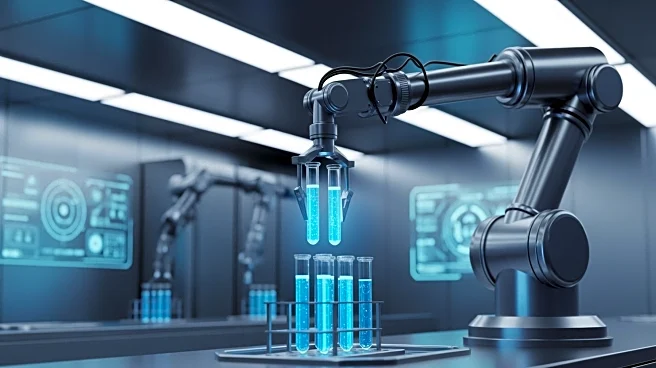What's Happening?
Telescope Innovations Corp has announced a significant development in the field of pharmaceutical research and development with the installation of its Self-Driving Lab (SDL) platform in Korea. The Korean Pharmaceutical and Biopharmaceutical Manufacturers
Association (KPBMA) has purchased this advanced platform for a new R&D facility in Seoul. This marks the first deployment of an SDL in Korea, aiming to accelerate pharmaceutical development through AI-driven experimentation. The SDL platform is designed to automate and optimize experiments continuously, offering substantial potential to reduce development timelines and enhance R&D efficiency. Telescope Innovations specializes in creating scalable manufacturing processes and tools for the pharmaceutical and chemical industries, utilizing flexible robotic platforms and artificial intelligence software to improve experimental throughput, efficiency, and data quality.
Why It's Important?
The installation of the Self-Driving Lab in Korea represents a significant step forward in the automation and digital transformation of pharmaceutical R&D. By leveraging AI-driven experimentation, the SDL platform can significantly reduce the time required for drug development, potentially leading to faster delivery of new treatments to the market. This advancement supports Korea's strategic shift towards more automated and digital R&D processes, positioning Telescope Innovations as a leader in this transformation. The broader applicability of the SDL platform across various industries could lead to enhanced efficiency and innovation in chemical and pharmaceutical research, benefiting both companies and consumers through improved products and services.
What's Next?
The deployment of the Self-Driving Lab in Korea is expected to catalyze further interest and investment in automated R&D solutions. As the SDL platform demonstrates its capabilities in reducing development timelines and improving efficiency, other pharmaceutical and biopharmaceutical companies may consider adopting similar technologies. This could lead to increased collaboration between Telescope Innovations and other industry stakeholders, potentially expanding the use of SDL platforms globally. Additionally, the success of this installation may encourage further advancements in AI-driven experimentation, driving innovation in pharmaceutical research and development.
Beyond the Headlines
The introduction of AI-driven experimentation through the Self-Driving Lab platform raises important ethical and regulatory considerations. As automation becomes more prevalent in pharmaceutical R&D, there will be a need to ensure that AI systems are transparent, reliable, and compliant with industry standards. The shift towards automated processes may also impact employment within the sector, necessitating workforce adaptation and retraining. Furthermore, the integration of AI in drug development could lead to new intellectual property challenges, as companies navigate the complexities of patenting AI-generated innovations.

















